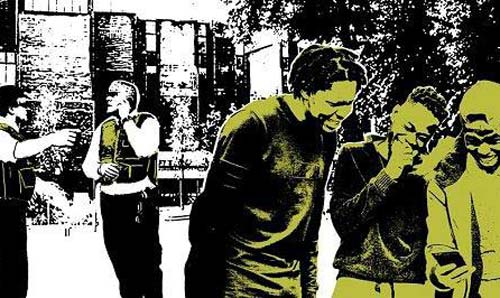Whose campus, whose security?
Report on students' views on, and experiences of, security services and policing on UK university campuses.

Authors: Remi Joseph-Salisbury, Laura Connelly, Kerry Pimblott, Siobhan O’Neill, and Harry Taylor.
Sign up to our mailing list for updates on this project.
Our report, 'Whose campus, whose security?' provides the first empirical account of students’ views on, and experiences with, security services and police on UK university campuses. It reveals that despite security staff being a common sight on university campuses, only one third (30.8%) of students surveyed agreed that they keep students safe on campus. The report follows a series of high-profile and controversial incidents involving campus security services and police and students at UK universities. Students raised concerns about racial profiling, gender-based violence, mental health, student activism and the way universities responded to complaints.
Watch the recording of the online launch of the report on 5 December 2023. The authors share key findings from the research, followed by a Q&A session.
- Campus security is deepening institutional racism in UK HE - Remi Joseph-Salisbury and Laura Connelly, Times Higher Education, January 2024.
- Campus security services can have a concerning impact on students - Remi Joseph-Salisbury, Laura Connelly and Siobhan O'Neill, Wonkhe, December 2023.
- Just 30% of students think that university security staff keep students safe on campus, The Canary, December 2023.
- Just one third of students feel security keeps students safe on campus - Miles Davenport, The Mancunion, December 2023.
Nehaal Bajwa, NUS Vice President for Liberation and Equality
"Growing security and police presence on campuses is not new, with more private security, card barriers, the hostile environment, and the Prevent duty operating at universities (and even colleges). During the pandemic, the number of police and security patrolling campus, with more powers than before, shot up. As this report finds, this increased racial profiling and harassment, and severely impacted students' mental health. Increased police and security presence creates a culture of fear especially for Black, Muslim, and LGBTQ+ students; international students; students who are women; and student sex workers.
The securitisation of our campuses and accommodation, the increased digital and in-person surveillance of students, and the clampdown on student activism and protest, clearly does not correlate with students feeling safer on campus. Instead, these practices further isolate students and deter them from seeking support when incidents occur.
Educational institutions should foster a culture of learning and compassion for their students. It is particularly telling that some institutions spend many millions more on security than on student counselling and mental health services. 'Student discipline' services that are serious about student wellbeing should centre support for those who are reporting harm, and Universities should work with their students' unions to support strong student communities which can act as protective factors against harmful behaviours."
Dr Shabna Begum, Interim co-CEO, Runnymede Trust
"We are deeply concerned with the securitisation of our educational spaces; whether it's police in schools - or campus security services, there is a creeping extension of a surveillance and punitive culture in spaces that should invite young people to feel nurtured and cared for. This report also highlights the racialised nature of that experience and that alongside students with other protected characteristics, they are afforded the least protection and experience the most restriction.
Perhaps most shocking is that the budget allocations for campus security services were more than double that allowed for counselling and mental health services, this is such an extraordinary indictment of an education system that would rather exert control than exercise care for its student community."
Ruth Ehrlich, Head of Policy and Campaigns at Liberty
We all want universities to be a place where students can learn, explore and grow. But the increasing presence of police on university campuses undermines this – and students don't believe the police keep them safe.
Too many students have experiences of police being violent towards themselves or their peers – particularly students who are Black or from ethnic minority backgrounds.
This report makes it clear that students want to see their universities prioritising approaches to student safety which don't require the police – such as more investment in late-night transport and increased funding for wellbeing and counselling services. As a society we urgently need to rethink the role of police in our communities, and look to alternatives which have fairness and human rights at their heart.
Liz Fekete, Director, Institute of Race Relations
No student should be enclosed within the environs of a heavily securitised, politically repressive campus, the consequences of which, for racially minoritised students, regarded as 'bodies out of place', can be devastating.
This multi-scalar study, with its informed analysis, anticipates growing anger over 'carceral campuses', while offering university administrators, willing to grasp the mettle, a way out of the current impasse.
